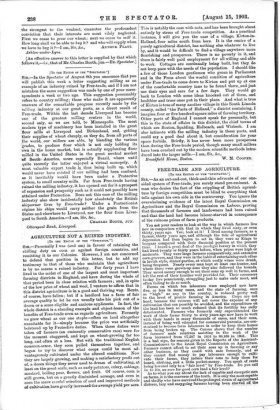AGRICULTURE NOT A RUINED INDUSTRY.
(TO THE EDITOR OP THE "SPECTATOR."l Srs,—Personally I was (and am) in favour of retaining the shilling duty on corn as against foreign countries, and remitting it to our Colonies. However, I am not concerned to defend that position in this letter, but to add my testimony to that of those who maintain that agriculture is by no means a ruined industry. For forty years I have lived in the midst of one of the largest and most important farming districts in England, and have during the whole of that period been in close relation with farmers; and, in spite of the low price of wheat and wool, I venture to affirm that in this district agriculture is in a good and thriving way. Rents, of course, have fallen; but if a landlord has a farm of fair average quality to let he can usually take his pick out of a dozen or a score eligible and anxious applicants. In fact, the whole district is a standing example and object-lesson of the benefits of Free-trade even as regards agriculture. Formerly we grew wheat as our one staple—often on land altogether unsuitable for it—simply because the price was artificially bolstered up by Protective duties. When these duties were taken off farmers (an eminently conservative race) were for the moment staggered, and kept on wheat-growing far too long, and often at a loss. But with the traditional English common-sense, they soon pulled themselves together, and began to try to discover what crops could be most ad- vantageously cultivated under the altered conditions. Now they are largely growing, and making a satisfactory profit out of, a dozen things they never used to dream of cultivating, at least on the great scale, such as early potatoes, celery, cabbage, mustard, boiling peas, flowers, and fruit. Of course, corn is still grown, but on a greatly diminished acreage, and even in corn the more careful selection of seed and improved methods of cultivation have greatly increased the average yield per acre. This is notably the case with oats, and has been brought about entirely by stress of Free•trade competition. As a practical instance, I will give you the case of a village; Kirton-in- Holland, four miles south from here. It is the centre of a purely agricultural district, has nothing else whatever to, live by, and it would be difficult to find a. village anywhere more flourishing and prosperous. There is no poverty in it, and there is fairly well paid employment for all willing and able to work. Cottages are continually being built, but they: do not keep pace with the needs of the population. I should like a few of those London gentlemen who groan in Parliament and in the Press about the woeful condition of agriculture under Free-trade to come down to Kirton and put up at one of the comfortable country inns to be found there,,and just use their eyes and ears for a few days. They would go back to London with some ideas knocked out of them, and healthier and truer ones put in their place. And what is true of Kirton is true of many another village in this South Lincoln county, called "the Parts of Holland," a district containing, I imagine, four or five hundred square miles of farming territory. Other parts of England I cannot speak for personally, but this is the state of affairs in this district, the chief towns of which are Boston, Spalding, Holbeach, and Wisbech. I am also intimate with the milling industry in these parts, and could say a good deal about it, but consideration for your space forbids. Briefly, it has never been more prosperous than during the Free-trade period, though many small millers have been crushed out by the modern scientific methods intro- duced into the larger mills.—I am, Sir, &c.,






































 Previous page
Previous page